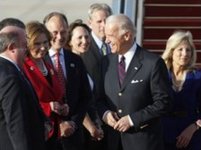 US Vice-President Joe Biden is to meet Israeli leaders, a day after arriving in the Middle East as part of a new initiative to revive the peace process.
US Vice-President Joe Biden is to meet Israeli leaders, a day after arriving in the Middle East as part of a new initiative to revive the peace process.
Mr Biden is expected to push Prime Minister Benjamin Netanyahu to resume talks, in the highest-level visit yet by an Obama administration official.
Hours before Mr Biden landed, Israel enraged Palestinians by approving 112 new homes in the occupied West Bank.
Iran's nuclear programme is expected to be at the top of Israel's agenda.
Mr Biden will try to reassure Mr Netanyahu that plans for tougher sanctions against Iran are serious, says the BBC's Middle East editor Jeremy Bowen in Jerusalem.
The US does not want Israel to take military action against Iran, which is much talked about there, our correspondent says.
In an interview on Tuesday with the Israeli newspaper Yedioth Ahronoth, Mr Biden stressed that the US would stand by Israel.
"I can promise the Israeli people that we will confront, as allies, any security challenge it will face. A nuclear-armed Iran would constitute a threat not only to Israel - it would also constitute a threat to the United States."
Mr Biden is due to hold talks with Israeli President Shimon Peres and opposition leader Tzipi Livni later on Tuesday.
On Wednesday, he will meet Palestinian leaders in the West Bank.
Palestinian Authority President Mahmoud Abbas has refused to meet Mr Netanyahu because of Israel's refusal to put a complete stop to building Jewish settlements in the West Bank and East Jerusalem.
In November, Israel announced a 10-month suspension of new building in settlements in the West Bank, under heavy US pressure.
But the government does not consider areas within the Jerusalem municipality to be settlements and the restrictions do not apply.
Despite the Palestinian position, President Abbas agreed on Monday to hold four months of indirect "proximity talks", during which the negotiating teams would meet separately with the US Middle East envoy George Mitchell, who would shuttle between them.
Any such discussions would mark the first time the Palestinians and Israelis have come together in any form for more than a year.
However, correspondents say no-one on either side is talking with any great optimism about what the indirect talks might achieve.
'More provocations'
Mr Biden's arrival came just hours after Israel infuriated Palestinians by approving the construction of 112 new housing units in the West Bank settlement of Beitar Illit.
The Israeli defence ministry said the units were approved before Israel agreed to the 10-month suspension of most new settlement construction, and that they were an "exception", because of safety and infrastructure issues.
But chief Palestinian negotiator Saeb Erekat said the move put the indirect talks at risk.
"We cannot tolerate that each time we have discussions on peace-making the Israeli government tenders more settlements, more incursions, more provocations," he told the AFP news agency.
A US state department spokesman said the development did not breach the building freeze, but was "the kind of thing both sides need to be cautious of".
Close to 500,000 Jews live in more than 100 settlements built since Israel's 1967 occupation of the West Bank and Arab East Jerusalem. They are considered illegal under international law, though Israel disputes this.



